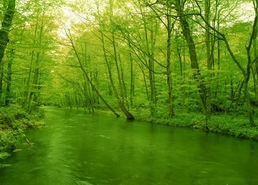 In the famous Chinese classical novel Dream of Red Mansions, Jia Baoyu says that girls are made of water. From the scientific point of view, boys and girls are equally made of water; as a matter of fact, our bodies are in large part water. Moreover, each of us needs to consume at least 5 liters of water per day, and everything we eat and drink contains water. All life is born in water, and so far as we know, life cannot exist without water. Even though countless human pursuits require water, it is only when we experience a water shortage or pay a water bill that we think much about this indispensable fluid. As it happens, my work is directly concerned with water: I am a consultant engaged in redesigning Beijing's rivers. Currently I am at work on plans for the future of the Wenyu River. In the famous Chinese classical novel Dream of Red Mansions, Jia Baoyu says that girls are made of water. From the scientific point of view, boys and girls are equally made of water; as a matter of fact, our bodies are in large part water. Moreover, each of us needs to consume at least 5 liters of water per day, and everything we eat and drink contains water. All life is born in water, and so far as we know, life cannot exist without water. Even though countless human pursuits require water, it is only when we experience a water shortage or pay a water bill that we think much about this indispensable fluid. As it happens, my work is directly concerned with water: I am a consultant engaged in redesigning Beijing's rivers. Currently I am at work on plans for the future of the Wenyu River.
Let's talk about the water system on which we are all 100% dependent. Water is part of a large cycle: it travels over land via rivers and lakes and through the oceans before evaporating \into\ the atmosphere and eventually returning to the surface by precipitation. Plants, bushes and trees also play a crucial role in the system: they keep the environment cool and maintain moisture in the air by transporting water up through their roots and releasing it by transpiration through their leaves. What keeps this vast system clean is a web of earth, plants and animals; when water cannot be in touch with these it is no longer a sustainable and healthy system. Rivers clean themselves quickly when pollution is not too great, so long as the water is moving and in contact with plants, soil and rock.
Yet we have thoughtlessly taken away from some rivers the natural means by which they keep themselves clean and nourish the land. For example, we have straightened numerous rivers to save acreage or facilitate transportation, and have replaced their natural bottoms and banks with concrete. This has created a situation in which water removed from the city never comes \into\ contact with soil and vegetation. These rivers of concrete make flooding worse and cities warmer. The fundamental problem is that we have taken too much water out of natural systems of flow.
Throughout history people have built their cities around water resources, often on rivers or natural harbors. Although we know water is the source of life, we started using these rivers, lakes and harbors as our sewers - as the place to dispose of our garbage. Our rivers are the places for putting wastewater and industrial waste, as well as the runoff from streets and the land. Today the demand for water is extremely high, as it is needed for domestic, agricultural and industrial purposes. Everything we put \into\ water goes some\where\. \where\ do the chemicals go that we use to clean our homes? How much fertilizer is just enough and \where\ do the excess chemicals go after they are put in the soil? \where\ does the water go that runs off the roads, this water that contains so many pollutants from our cars and city streets?
All wastewater needs to be treated, human and industrial wastewater separately. Yet only 40% of Beijing's wastewater is treated, with the remainder going directly \into\ rivers. Nowadays there are many types of treatment systems, ranging from high-cost technical systems requiring lots of water and energy, to self-sustaining systems that use their own by-products for energy and food. With greater understanding of river systems, the government has now begun to restore natural riverbanks, enabling rivers to flow once again through trees and brush.
Road construction and drainage are very important factors in determining the health of rivers. Runoff must be returned to the soil and cleaned with the help of vegetation, not allowed to flow directly \into\ rivers. Farmers are being induced to switch to irrigation methods that use relatively low amounts of water; they also need to make sure untreated runoff from stock areas and fertilized fields does not enter rivers and lakes. Golf courses can be designed to recycle their water through wetlands and use fewer chemicals. All this is not more expensive; in fact it is usually cheaper.
It is important to learn about your water systems. Insist that they be treated with respect, not used as garbage dumps or drainage ditches, but as living systems essential to the wellbeing of society. Our homes, schools, farms and factories are part of that overall water system. Each of these places can become part of the solution.
You as an individual can also be part of the solution. Become someone who cares about the water in our environment; join with other people and \group\s who are acting to preserve and restore water.
| ![]() 本网站由北京信息港提供网络支持
本网站由北京信息港提供网络支持
![]() 本网站由北京信息港提供网络支持
本网站由北京信息港提供网络支持